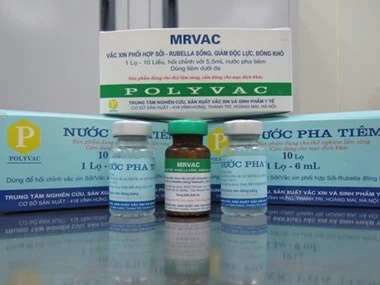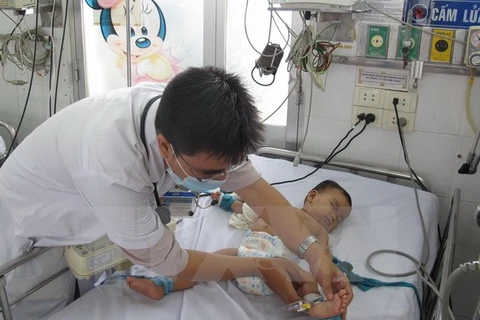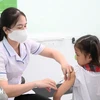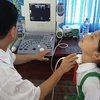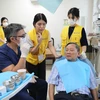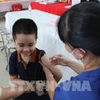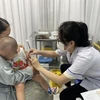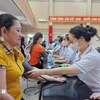 A doctor vaccinates a child against Japanese encephalitis in Quang Tri Province’s Cat Village. (Photo: VNA)
A doctor vaccinates a child against Japanese encephalitis in Quang Tri Province’s Cat Village. (Photo: VNA) Hanoi (VNA) - The national immunisation programme will give supplemental vaccinations against Japanese encephalitis to children between six and 15 years old, who did not receive the vaccine, or are not sure about their vaccination schedule previously, in districts facing high risks of the disease.
The plan will be carried out in 2017-18.
The information was released by associate professor Tran Nhu Duong, deputy director of the National Institute of Hygiene and Epidemiology.
Duong said that Vietnam saw about 1,000 cases of encephalitis per year, and 10 percent of them were Japanese encephalitis.
Nearly 60 percent of the cases were in northern provinces.
Most patients are between one and 10 years old and were unsure if they had received the vaccination or not.
Under the plan, children between six and 15 years old will receive three doses of the vaccine.
The plan will cover several districts in Son La, Dien Bien, Lang Son and Bac Kan northern provinces, Quang Tri, Thua Thien-Hue, Quang Nam and Quang Ngai central provinces.
The districts had at least one problem related to the disease, including the rate of vaccination against Japanese encephalitis being under 80 percent, the rate of Japanese encephalitis equal to or more than 1/100,000 residents, and fatalities caused by Japanese encephalitis in two consecutive years.
The national programme will provide vaccinations for about 3.4 million children, who are from one to two years old, per year nationwide.
Experts from the Preventive Medicines Department under the Ministry of Health said that Japanese encephalitis could occur year-round, and the epidemic often occurs in summer months, because mosquitoes can develop during those months.
Anyone who is not vaccinated can suffer from the disease.
Experts warned that to prevent the disease, people should ensure environmental hygiene, clean accommodation, use mosquito nets while sleeping and not let children go near animals.
Vaccination is the most effective preventive measure.
But only one dose of the vaccine is not strong enough, so children should receive three basic doses. The first dose is when they are one year old, the second one or two weeks later, and the third one year later. Children should also receive booster injections every four years until they are 15 years old.-VNA
VNA

